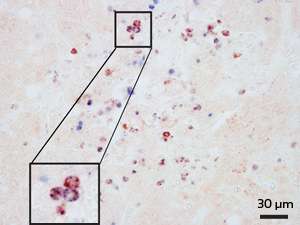The presence of natural killer cells (blue) expressing high levels of TLR3 protein (red) in HCC tumors is associated with a better prognosis and longer patient survival. Inset shows a cluster of natural killer cells with elevated TLR3. Credit: Oxford University Press
Though it originates from the body's own cells, a tumor is as much of a hostile invader as any virus or bacterium. If the immune system is sufficiently sensitized, it can mount a counterattack just as it might fight an infection. For many patients, this response is insufficient, but researchers led by Jean-Pierre Abastado of the A*STAR Singapore Immunology Network have uncovered an immune mechanism that may help patients with hepatocellular carcinoma (HCC) keep their liver cancer at bay.
Certain viral infections stimulate the innate immune system via the toll-like receptor 3 (TLR3) protein, but TLR3 activation also seems to kill certain cancers. Accordingly, the researchers had previously observed improved odds of survival among Singaporean HCC patients with elevated tumor TLR3 levels. Abastado and co-workers subsequently verified these initial findings in an additional cohort of patients from Hong Kong and Zurich, and demonstrated that increased survival time was associated with high TLR3 levels in both tumor cells and tumor-infiltrating immune cells.
Mouse model experiments demonstrated that TLR3 stimulation causes tumor cells to essentially 'self-destruct', while also recruiting a subset of natural killer (NK) innate immune cells to penetrate and attack the tumor. The remnants of the dead tumor cells further stimulate TLR3 signaling, accelerating the immune counterattack. "The triggering of TLR3 kick-starts a positive feedback loop that creates more cell death, and triggers more activation of TLR3 in both tumor and NK cells," explains Valerie Chew, a postdoctoral researcher in Abastado's laboratory and lead author of the research paper. In addition, TLR3 activation also summons other immune-cell subtypes; the researchers demonstrated that this immune recruitment is critical for tumor reduction in mice.
Analysis of patient HCC tumor samples revealed similar results (see image), where elevated TLR3 activity was associated with high levels of immune activity and increased tumor cell death. Why TLR3 levels are elevated in certain patients remains unclear, but Chew hypothesizes that their immune systems may be receiving a boost from certain pathogens. "It is conceivable that co-infection with viruses such as acute influenza may trigger expression of TLR3," she says, "and we believe that mounting an antiviral immune response via TLR3 actually provides protection against cancer."
As an alternative to catching influenza, HCC patients may benefit from TLR3-activating drugs such as Hiltonol, from US pharmaceutical company Oncovir. Hiltonol is in early clinical trials for the treatment of breast cancer and melanoma. Abastado's team is exploring the potential for an HCC trial of Hiltonol in collaboration with Oncovir and Han Chong Toh from Singapore General Hospital.
More information: Chew, V. et al. Toll-like receptor 3 expressing tumor parenchyma and infiltrating natural killer cells in hepatocellular carcinoma patients. Journal of the National Cancer Institute 104, 1796–1807 (2012). jnci.oxfordjournals.org/content/104/23/1796
Journal information: Journal of the National Cancer Institute





















